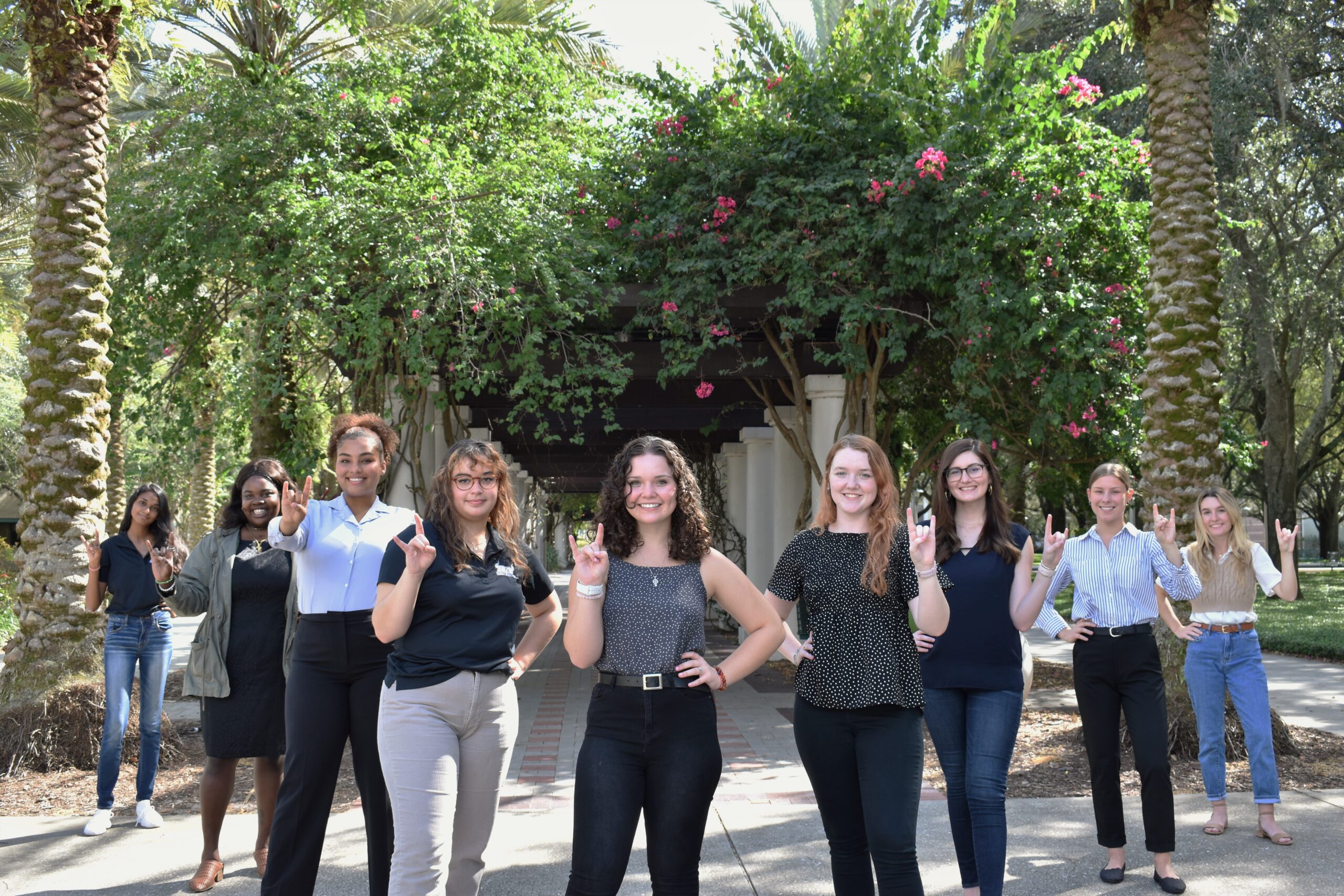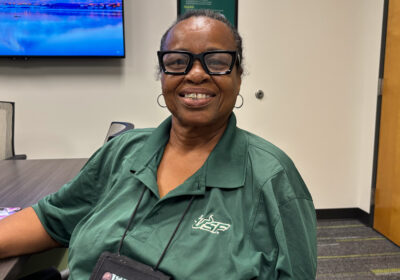SG federal executive branch makes history as first all-female cabinet

Sitting with her peers for the first time in person allowed members of Student Government’s (SG) executive branch to process the history they were making as the first all-female federal executive cabinet, a moment SG Attorney General Alliyah Edwards said felt as if they did the “impossible.”
“It really made it real, like, ‘Oh my gosh, this is our cabinet, all of us are here,’” Edwards said. “We were all looking around, like, ‘Oh my gosh, we’re all women’ … and we all just started laughing. We were just really, really happy. I can’t really describe the moment other than it was just really exciting, unheard of and it felt refreshing.”
The branch, made up of only women, is led by the first-time all-female presidential ticket — Student Body President Julia Cunningham and Student Body Vice President Jillian Wilson.
The cabinet is composed of Chief of Staff Monica Smith, Chief Financial Officer Victoria Williams, Edwards, Solicitor General Natalie Vlckova, Chief Marketing Officer Amanda Baxter, Multimedia Specialist Renuka Persaud, Graphic Design Specialist Sydney Zerbe, Wilson and Cunningham.
The fact that all the members of the cabinet are female, however, doesn’t mean they were chosen based on that, according to Wilson. She said only having women wasn’t planned, but rather a surprise when they finished the hiring process.
“We just had a lot of strong women that came out into those interviews and did a phenomenal job, and they showed up and showed out,” Wilson said. “We had to hire the best person for each of the roles, and it just happened to be a woman, which is an amazing coincidence, and we are so thankful for all of our staff and our cabinet.”
Baxter said members were picked because of how they presented themselves and how they would represent the student body.
“That is just a more sentimental meaning because it’s like, ‘Yes, we’re females. But at the end of the day, why does our gender have to matter,’” Baxter said. “Because we’re putting so much effort in, so much work to represent everybody.”
When the executive branch members first saw each other during an Oct. 2 executive retreat, led by Wilson and SG advisers, they talked about group and individual expectations, initiatives and emotional intelligence.
During the retreat, cabinet members also had a diversity training where Edwards said they talked about possibly being challenged by people from the USF community, such as administrators or students, for being an all-female cabinet.
They discussed how to navigate possible scenarios where people might have misconceptions about women. Some of the learning included speaking up in a respectful way no matter the circumstances and channeling emotions to give the message as clearly as possible.
“We just have to figure out how to navigate through some of those spaces where sometimes we won’t always be heard in the way that we want to, or always seen the way that we want to. A lot of times people think women are emotional, or that we can’t really think analytically, but that’s not true,” Edwards said. “We can do everything … that other people can do.”
The cabinet has had conversations about those challenges and the shared issues some of the women in the cabinet face for being women of color, part of the LGBTQ community or simply women since the diversity and inclusion training, according to Cunningham. She said she appreciated that even if members come from different backgrounds, they can relate to each other.
“I know that there have been times in having this role where I was being treated a certain way, or I was being questioned because I was a woman,” Cunningham said. “It was really great to be able to talk to my staff, and them being like, ‘I understand, I’ve been there, too.’ This is how we can help support each other.’
“I think that was something really great, and I got a lot out of it.”
Having that type of support makes the work environment feel welcoming and inclusive, according to Smith. Although they are co-workers, Smith said she can talk to the other members when there are hardships and she knows they will be understanding.
“[The dynamic in the cabinet is] having someone that understands the inherent struggle it is to sometimes be a woman in higher positions of power,” Smith said. “And [having] that support system within the cabinet.”
Smith said the diversity within the cabinet allowed them to have important conversations in the retreat to understand they can support each other no matter their background.
“It doesn’t matter if you’re a minority or not, you can always benefit from diversity talks,” Smith said. “Seeing what we can do and being able to talk to a group of people that [were] genuinely understanding there are these struggles. Let’s talk about them. Let’s hear one another. Let’s support each other. [That] was a really, really great part of the retreat.”
Besides the understanding environment, working alongside eight women in the executive branch this semester has empowered Edwards. In previous years working in SG, she said she sometimes felt overshadowed by men.
“Because [men] have louder voices, and they’re more dominant,” Edwards said. “You would feel like you weren’t heard and sometimes it can be hard and you feel like you don’t want to speak up anymore. So you tend to be more quiet in situations where you want to stand up.”
Edwards said she now feels the members of her cabinet can relate to her and the environment makes her want to go to work every day.
“A lot of times women get told that we can’t do things and it’s like, we’re going to show you this didn’t just happen out of thin air,” Edwards said.
“It’s really cool to know that [we] naturally were able to gravitate toward one another. We’re all leaders, and now we can actually prove to people that thought that we couldn’t do it that we can.”







